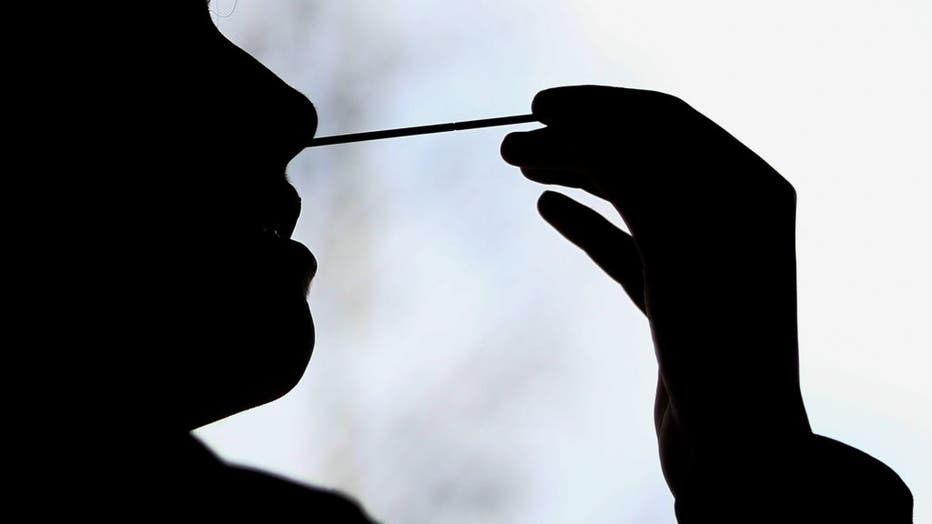Are at-home COVID-19 tests accurate and do they detect the omicron variant?
Are COVID-19 at-home tests accurate?
You can buy a COVID-19 test at the store, but how reliable are these at-home tests?
SOUTHFIELD, Mich. (FOX 2/AP) - The demand for COVID-19 testing has never been higher with lines stretching around the blocks of some pharmacies and waits of several hours (even with in appointment), now Americans are turning to at-home COVID-19 test kits.
The benefit of rapid antigen tests (at-home) are obvious: you can do it in the comfort of your own home, you can skip waiting in line, and they typically are pretty accurate in determining if you are carrying COVID-19.
Severe sore throat, runny nose -- omicron symptoms resemble flu, cold
How accurate are at-home COVID-19 tests?
Rapid antigen tests are very accurate at detecting COVID-19 - upwards of 85% accurate, according to the New York Times - especially if people have symptoms and it's been within one week since the onset of symptoms.
At-home tests detect the virus in people who have high viral loads, meaning they're more likely to be transmitting the virus to others.
COVID, cold or flu? Pay attention to timing, symptoms, doctor says
While antigen tests aren't perfect, they're a quick and effective way to test yourself if you believe you've possibly been exposed. For confirmation either way, a Polymerase Chain Reaction (PCR) test is best.
PCR tests are sent off to a lab and can detect even the smallest amount of traces of the virus.

A person takes a swab for the COVID-19 antigen self-test in this illustration photo taken in Poland on December 27, 2021. (Photo by Jakub Porzycki/NurPhoto via Getty Images)
Do at-home COVID-19 tests detect the omicron variant?
Yes, but U.S. health officials say early data suggests they may be less sensitive at picking it up.
Government recommendations for using at-home tests haven't changed. People should continue to use them when a quick result is important.
"The bottom line is the tests still detect COVID-19 whether it is delta or alpha or omicron," says Dr. Emily Volk, president of the College of American Pathologists.
Chicago teacher quarantines in plane’s bathroom for 4 hours after testing positive for COVID-19
Government scientists have been checking to make sure the rapid tests still work as each new variant comes along. And this week, the Food and Drug Administration said preliminary research indicates they detect omicron, but may have reduced sensitivity. The agency noted it's still studying how the tests perform with the variant, which was first detected in late November.
Dr. Anthony Fauci, the top U.S. infectious disease expert, said the FDA wanted to be "totally transparent" by noting the sensitivity might come down a bit, but that the tests remain important.
When to use a COVID-19 at-home test
There are many good uses for at-home tests, Volk says. Combined with vaccination, they can make you more comfortable about gathering with family and friends.
If you've been exposed to a person who tested positive but you don't have symptoms, a rapid test five days later can give a good indication of whether you caught the virus. It can also help if you're not sure whether your runny nose or sore throat is COVID-19.
But consider the context when looking at results. If you feel sick after going out to a nightclub in an area with high infection rates, for example, you should look at a negative result from an at-home test with a little more skepticism, Volk says.
Following up with a PCR test is a good idea, she says. Those tests are more accurate and are done at testing sites and hospitals.
Where to find a COVID-19 test
If you're looking for an at-home version, you're out of luck.
You can check your local pharmacies, Walmart, Meijer, or Kroger, but they're likely all sold out. A quick search on Amazon netted only a couple of results but they won't be at your home until the middle or end of next week.
A better option would be to find a testing appointment near you.
MDHHS is partnered with Solv to help you find appointments. You may end up waiting for a bit to get a test but they're 100% free.
With the Associated Press.

